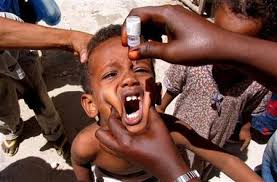Variations
in DNA at a specific location, locus, on the genome that protect African
children from developing severe malaria, in some cases nearly halving a child’s
chance of developing the life-threatening disease, have been identified in the
largest genetic association study.
The findings detail a new gene locus that can explain why, in communities where
everyone is constantly exposed to malaria, some children develop severe malaria
and others don’t. Now, researchers can be sure that this particular stretch of
our DNA plays a crucial role in the progression of the disease.

The research was conducted by MalariaGEN, an international network of
scientists and clinicians spread across Africa, Asia and other malaria-endemic
regions of the world, largely funded by the Wellcome Trust. In this study they
analysed data from eight different African countries: Burkina Faso, Cameroon,
Ghana, Kenya, Malawi, Mali, The Gambia and Tanzania.

To identify the new locus, researchers performed a genome-wide association
study (GWAS) that compared the DNA of 5,633 children with severe malaria with
the DNA of 5,919 children without severe malaria. They then replicated their
key findings in a further 14,000 children.
The new locus they have identified is near a cluster of genes which code for
proteins called ‘glycophorins’ that are involved in the malaria parasite’s
invasion of red blood cells.

Although many different malaria resistance loci have been postulated over the
years, this is one of very few that have stood up to stringent testing in a
large multi-centre study; the others include the genes for sickle cell and the
O blood group.
A particularly strongly-protective variant, known in genetics as an allele, was
found most commonly among children in Kenya in East Africa. Having this allele
reduces the risk of severe malaria by about 40% in Kenyan children, with a
slightly smaller effect across all the other populations studied.

The authors speculate that this difference between populations could be due to
the genetic features of the local malaria parasite in East Africa.
Intriguingly, the new genetic resistance locus lies within a region of the
genome where humans and chimpanzees have been known to share particular
combinations of DNA variants, known as haplotypes. This indicates that some of
the variation seen in contemporary humans has been present for millions of
years.

The finding also suggests that this region of the genome is the subject of
"balancing selection".
Balancing selection happens when a particular genetic variant evolves because
it confers health benefits, but it is carried by only a proportion of the
population because it also has damaging consequences.
The classic example is the sickle cell gene – people with one copy of the gene
are strongly protected against malaria but those with two copies of the gene
develop a life-threatening condition known as sickle-cell disease.

Professor Dominic Kwiatkowski, one of the lead authors of the paper, from the
Wellcome Trust Sanger Institute and the Wellcome Trust Centre for Human
Genetics, said: “We can now say, unequivocally, that genetic variations in this
region of the human genome provide strong protection against severe malaria in
real-world settings, making a difference to whether a child lives or dies.
“These findings indicate that balancing selection and resistance to malaria are
deeply intertwined themes in our ancient evolutionary history. ■
0 comments:
Post a Comment
Please insert your comments here